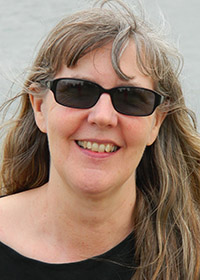 Dr. Martha (Molly) Hunter is a professor in the Department of Entomology and in the Department of Ecology & Evolutionary Biology at the University of Arizona. She also serves as the chair of the Graduate Interdisciplinary Program in Entomology & Insect Science. She is known for her work on the ecology and evolution of insects, particularly with respect to insect interactions with bacterial symbionts.
Dr. Martha (Molly) Hunter is a professor in the Department of Entomology and in the Department of Ecology & Evolutionary Biology at the University of Arizona. She also serves as the chair of the Graduate Interdisciplinary Program in Entomology & Insect Science. She is known for her work on the ecology and evolution of insects, particularly with respect to insect interactions with bacterial symbionts.
Hunter was born in Hanover, New Hampshire, and went to Brown University, where she received a B.A. in biology in 1980. She attended graduate school at Cornell University in the Department of Entomology, where she received her M.S. in 1987 and her Ph.D. in 1991. She received a NATO Postdoctoral Fellowship and an NSF Fellowship for her first postdoctoral appointment with Charles Godfray at Silwood Park, Imperial College, in Berkshire, UK. She then did a second postdoctoral appointment at Texas A&M, working with Jim Woolley, Bob Wharton, and Mike Rose. She moved to the University of Arizona as an assistant professor in 1996.
Hunter is internationally known for her study of how bacterial symbionts influence herbivores, parasitoids, and the parasitoid-host interaction. A general finding is that symbionts may radically change the biology and behavior of their insect hosts. Hunter led the team discovering and characterizing the intracellular bacterial symbiont Cardinium hertigii, which manipulates the reproduction of its arthropod hosts. They found that Cardinium caused the mating incompatibility known as cytoplasmic incompatibility and parthenogenesis-induction in whitefly parasitoids, two roles previously thought to be uniquely associated with Wolbachia. Cardinium also influences the behavior of parthenogenetic wasps, changing their host choice. In collaboration with Nancy Moran, and led by Ph.D. student Kerry Oliver, Hunter and colleagues discovered a beneficial defensive role of facultative symbionts with studies of pea aphid symbionts that conferred protection against parasitoid wasps. In collaboration with Einat Zchori-Fein, Hunter documented the rapid spread, the eventual decline, and the transformational effects on fitness of a Rickettsia species in a sap-feeding whitefly pest, the invasive Bemisia tabaci.
Hunter has published 85 peer-reviewed research articles, collectively cited more than 7,300 times, with 18 papers cited more than 100 times each. She has been funded by NSF, USDA National Institute of Food and Agriculture, the Binational (US-Israel) Science Foundation, and US-Israel Binational Agriculture Research and Development (BARD). She is a Fellow of the American Association for the Advancement of Science and of the Japan Society for the Promotion of Science, and she has given 58 invited presentations in 12 countries. She has received awards for mentoring and teaching from both the College of Agriculture and LIfe Sciences at the University of Arizona and the Pacific Branch of ESA.
Hunter and her husband Mark Lochrin live in Tucson, Arizona, where their son Rowan lives nearby and is a software engineer. She enjoys the outdoors and travel, especially to Sydney, Australia, where Lochrin was born, and to New England.
